- Home
- Ken Follett
The Man From St. Petersburg Page 4
The Man From St. Petersburg Read online
Page 4
"I do," Feliks said. They all looked at him. The shadows on their faces shifted in the flickering candlelight. "I know how it can be done." His voice sounded strange to him, as if his throat were constricted. "I'll go to London. I'll kill Orlov."
The room was suddenly quiet, as all the talk of death and destruction suddenly became real and concrete in their midst. They stared at him in surprise, all except Ulrich, who smiled knowingly, almost as if he had planned, all along, that it would turn out this way.
TWO
London was unbelievably rich. Feliks had seen extravagant wealth in Russia and much prosperity in Europe, but not on this scale. Here nobody was in rags. In fact, although the weather was warm, everyone was wearing several layers of heavy clothing. Feliks saw carters, street vendors, sweepers, laborers and delivery boys--all sporting fine factory-made coats without holes or patches. All the children wore boots. Every woman had a hat, and such hats! They were mostly enormous things, as broad across as the wheel of a dog cart, and decorated with ribbons, feathers, flowers and fruit. The streets were teeming. He saw more motor cars in the first five minutes than he had in all his life. There seemed to be as many cars as there were horse-drawn vehicles. On wheels or on foot, everyone was rushing.
In Piccadilly Circus all the vehicles were at a standstill, and the cause was one familiar in any city: a horse had fallen and its cart had overturned. A crowd of men struggled to get beast and wagon upright, while from the pavement flower girls and ladies with painted faces shouted encouragement and made jokes.
As he went farther east his initial impression of great wealth was somewhat modified. He passed a domed cathedral which was called St. Paul's, according to the map he had bought at Victoria Station, and thereafter he was in poorer districts. Abruptly, the magnificent facades of banks and office buildings gave place to small row houses in varying states of disrepair. There were fewer cars and more horses, and the horses were thinner. Most of the shops were street stalls. There were no more delivery boys. Now he saw plenty of barefoot children--not that it mattered, for in this climate, it seemed to him, they had no need of boots anyway.
Things got worse as he penetrated deeper into the East End. Here were crumbling tenements, squalid courtyards and stinking alleys, where human wrecks dressed in rags picked over piles of garbage, looking for food. Then Feliks entered Whitechapel High Street, and saw the familiar beards, long hair and traditional robes of assorted Orthodox Jews, and tiny shops selling smoked fish and kosher meat: it was like being in the Russian Pale, except that the Jews did not look frightened.
He made his way to 165 Jubilee Street, the address Ulrich had given him. It was a two-story building that looked like a Lutheran chapel. A notice outside said The Workers Friend Club and Institute was open to all working men regardless of politics, but another notice betrayed the nature of the place by announcing that it had been opened in 1906 by Peter Kropotkin. Feliks wondered whether he would meet the legendary Kropotkin here in London.
He went in. He saw in the lobby a pile of newspapers, also called The Workers Friend but in Yiddish: Der Arbeiter Fraint. Notices on the walls advertised lessons in English, a Sunday school, a trip to Epping Forest and a lecture on Hamlet. Feliks stepped into the hall. The architecture confirmed his earlier instinct: this had definitely been the nave of a nonconformist church once upon a time. However, it had been transformed by the addition of a stage at one end and a bar at the other. On the stage a group of men and women appeared to be rehearsing a play. Perhaps this was what anarchists did in England, Feliks thought; that would explain why they were allowed to have clubs. He went over to the bar. There was no sign of alcoholic drink, but on the counter he saw gefilte fish, pickled herring and--joy!--a samovar.
The girl behind the counter looked at him and said, "Nu?"
Feliks smiled.
A week later, on the day that Prince Orlov was due to arrive in London, Feliks had lunch at a French restaurant in Soho. He arrived early and picked a table near the door. He ate onion soup, fillet steak and goat's cheese, and drank half a bottle of red wine. He ordered in French. The waiters were deferential. When he finished, it was the height of the lunch-hour rush. At a moment when three of the waiters were in the kitchen and the other two had their backs to him he calmly got up, went to the door, took his coat and hat and left without paying.
He smiled as he walked down the street. He enjoyed stealing.
He had quickly learned how to live in this town on almost no money. For breakfast he would buy sweet tea and a slab of bread from a street stall for twopence, but that was the only food he would pay for. At lunchtime he stole fruit or vegetables from street stalls. In the evening he would go to a charity soup kitchen and get a bowl of broth and unlimited bread in return for listening to an incomprehensible sermon and singing a hymn. He had five pounds in cash but it was for emergencies.
He was living at Dunstan Houses in Stepney Green, in a five-story tenement building where lived half the leading anarchists in London. He had a mattress on the floor in the apartment of Rudolf Rocker, the charismatic blond German who edited Der Arbeiter Fraint. Rocker's charisma did not work on Feliks, who was immune to charm, but Feliks respected the man's total dedication. Rocker and his wife, Milly, kept open house for anarchists, and all day--and half the night--there were visitors, messengers, debates, committee meetings and endless tea and cigarettes. Feliks paid no rent, but each day he brought home something--a pound of sausages, a packet of tea, a pocketful of oranges--for the communal larder. They thought he bought these things, but of course he stole them.
He told the other anarchists he was here to study at the British Museum and finish his book about natural anarchism in primitive communities. They believed him. They were friendly, dedicated and harmless: they sincerely believed the revolution could be brought about by education and trade unionism, by pamphlets and lectures and trips to Epping Forest. Feliks knew that most anarchists outside Russia were like this. He did not hate them, but secretly he despised them, for in the end they were just frightened.
Nevertheless, among such groups there were generally a few violent men. When he needed them he would seek them out.
Meanwhile he worried about whether Orlov would come and about how he would kill him. Such worries were useless, and he tried to distract his mind by working on his English. He had learned a little of the language in cosmopolitan Switzerland. During the long train journey across Europe he had studied a school textbook for Russian children and an English translation of his favorite novel, The Captain's Daughter by Pushkin, which he knew almost by heart in Russian. Now he read The Times every morning in the reading room of the Jubilee Street club, and in the afternoons he walked the streets, striking up conversations with drunks, vagrants and prostitutes--the people he liked best, the people who broke the rules. The printed words in books soon meshed with the sounds all around him, and already he could say anything he needed to. Before long he would be able to talk politics in English.
After leaving the restaurant he walked north, across Oxford Street, and entered the German quarter west of Tottenham Court Road. There were a lot of revolutionists among the Germans, but they tended to be communists rather than anarchists. Feliks admired the discipline of the communists but he was suspicious of their authoritarianism; and besides, he was temperamentally unsuited to party work.
He walked all the way across Regent's Park and entered the middle-class suburb to its north. He wandered around the tree-lined streets, looking into the small gardens of the neat brick villas, searching for a bicycle to steal. He had learned to ride a bicycle in Switzerland, and had discovered that it was the perfect vehicle for shadowing someone, for it was maneuverable and inconspicuous, and in city traffic it was fast enough to keep up with a motor car or a carriage. Sadly, the bourgeois citizens of this part of London seemed to keep their bicycles locked away. He saw one cycle being ridden along the street and was tempted to knock the rider off the machine, but at that moment there were three
pedestrians and a baker's van on the road, and Feliks did not want to create a scene. A little later he saw a boy delivering groceries, but the boy's cycle was too conspicuous, with a large basket on the front and a metal plate hanging from the crossbar, bearing the name of the grocer. Feliks was beginning to toy with alternative strategies when at last he saw what he needed.
A man of about thirty came out of one of the gardens wheeling a bicycle. The man wore a straw boater and a striped blazer which bulged over his paunch. He leaned his cycle against the garden wall and bent down to put on his trouser clips.
Feliks approached him rapidly.
The man saw his shadow, looked up, and muttered: "Good afternoon."
Feliks knocked him down.
The man rolled onto his back and looked up at Feliks with a stupid expression of surprise.
Feliks fell on him, dropping one knee into the middle button of the striped blazer. The man's breath left his body in a whoosh, and he was winded, helpless, gasping for air.
Feliks stood up and glanced toward the house. A young woman stood at a window watching, her hand raised to her open mouth, her eyes wide with fright.
He looked again at the man on the ground: it would be a minute or so before he even thought about getting up.
Feliks climbed on the bicycle and rode away rapidly.
A man who has no fear can do anything he wants, Feliks thought. He had learned that lesson eleven years ago, in a railway siding outside Omsk. It had been snowing . . .
It was snowing. Feliks sat in an open railway truck, on a pile of coal, freezing to death.
He had been cold for a year, ever since he escaped from the chain gang in the gold mine. In that year he had crossed Siberia, from the frozen north almost to the Urals. Now he was a mere thousand miles from civilization and warm weather. Most of the way he had walked, although sometimes he rode in railcars or on wagons full of pelts. He preferred to ride with cattle, for they kept him warm and he could share their feed. He was vaguely aware that he was little more than an animal himself. He never washed, his coat was a blanket stolen from a horse, his ragged clothes were full of lice and there were fleas in his hair. His favorite food was raw birds' eggs. Once he had stolen a pony, ridden it to death, then eaten its liver. He had lost his sense of time. He knew it was autumn, by the weather, but he did not know what month he was in. Often he found himself unable to remember what he had done the day before. In his saner moments he realized he was half mad. He never spoke to people. When he came to a town or village he skirted it, pausing only to rob the garbage dump. He knew only that he had to keep going west, for it would be warmer there.
But the coal train had been shunted onto a siding, and Feliks thought he might be dying. There was a guard, a burly policeman in a fur coat, who was there to stop peasants from taking coal for their fires . . . As that thought occurred to him, Feliks realized he was having a lucid moment, and that it might be his last. He wondered what had brought it on; then he smelled the policeman's dinner. But the policeman was big and healthy and had a gun.
I don't care, Feliks thought; I'm dying anyway.
So he stood up, and picked up the biggest lump of coal he could carry, and staggered over to the policeman's hut, and went in, and hit the startled policeman over the head with the lump of coal.
There was a pot on the fire and stew in the pot, too hot to eat. Feliks carried the pot outside and emptied it out into the snow; then he fell on his knees and ate the food mixed with cooling snow. There were lumps of potato and turnip, and fat carrots, and chunks of meat. He swallowed them whole. The policeman came out of the hut and hit Feliks with his club, a heavy blow across the back. Feliks was wild with rage that the man should try to stop him from eating. He got up from the ground and flew at the man, kicking and scratching. The policeman fought back with his club, but Feliks could not feel the blows. He got his fingers on the man's throat and squeezed. He would not let go. After a while the man's eyes closed; then his face went blue; then his tongue came out; then Feliks finished the stew.
He ate all the food in the hut, and warmed himself by the fire, and slept in the policeman's bed. When he woke up he was sane. He took the boots and the coat off the corpse and walked to Omsk. On the way he made a remarkable discovery about himself: he had lost the ability to feel fear. Something had happened in his mind, as if a switch had closed. He could think of nothing that could possibly frighten him. If hungry, he would steal; if chased, he would hide; if threatened, he would kill. There was nothing he wanted. Nothing could hurt him anymore. Love, pride, desire and compassion were forgotten emotions.
They all came back, eventually, except the fear.
When he reached Omsk he sold the policeman's fur coat and bought trousers and a shirt, a waistcoat and a topcoat. He burned his rags and paid one ruble for a hot bath and a shave in a cheap hotel. He ate in a restaurant, using a knife instead of his fingers. He saw the front page of a newspaper, and remembered how to read; and then he knew he had come back from the grave.
He sat on a bench in Liverpool Street station, his bicycle leaning against the wall beside him. He wondered what Orlov was like. He knew nothing about the man other than his rank and mission. The Prince might be a dull, plodding, loyal servant of the Czar, or a sadist and a lecher, or a kindly white-haired old man who liked nothing better than to bounce his grandchildren on his knee. It did not matter: Feliks would kill him anyway.
He was confident he would recognize Orlov, for Russians of that type had not the faintest conception of traveling unobtrusively, secret mission or no.
Would Orlov come? If he did come, and arrived on the very train Josef had specified, and if he subsequently met with the Earl of Walden as Josef had said he would, then there could hardly be any further doubt that Josef's information had been accurate.
A few minutes before the train was due, a closed coach drawn by four magnificent horses clattered by and drove straight onto the platform. There was a coachman in front and a liveried footman hanging on behind. A railwayman in a military-style coat with shiny buttons strode after the coach. The railwayman spoke to the coachman and directed him to the far end of the platform. Then a stationmaster in a frock coat and top hat arrived, looking important, consulting his job watch and comparing it critically with the station clocks. He opened the carriage door for the passenger to step down.
The railwayman walked past Feliks's bench, and Feliks grabbed his sleeve. "Please, sir," he said, putting on the wide-eyed expression of a naive foreign tourist. "Is that the King of England?"
The railwayman grinned. "No, mate, it's only the Earl of Walden." He walked on.
So Josef had been right.
Feliks studied Walden with an assassin's eye. He was tall, about Feliks's height, and beefy--easier to shoot than a small man. He was about fifty. Except for a slight limp he seemed fit; he could run away, but not very fast. He wore a highly visible light gray morning coat and a top hat of the same color. His hair under the hat was short and straight, and he had a spade-shaped beard patterned after that of the late King Edward VII. He stood on the platform, leaning on a cane--potential weapon--and favoring his left leg. The coachman, the footman and the stationmaster bustled about him like bees around the queen. His stance was relaxed. He did not look at his watch. He paid no attention to the flunkies around him. He is used to this, Feliks thought; all his life he has been the important man in the crowd.
The train appeared, smoke billowing from the funnel of the engine. I could kill Orlov now, Feliks thought, and he felt momentarily the thrill of the hunter as he closes with his prey; but he had already decided not to do the deed today. He was here to observe, not to act. Most anarchist assassinations were bungled because of haste or spontaneity, in his view. He believed in planning and organization, which were anathema to many anarchists; but they did not realize that a man could plan his own actions--it was when he began to organize the lives of others that he became a tyrant.
The train halted with a great sigh o
f steam. Feliks stood up and moved a little closer to the platform. Toward the far end of the train was what appeared to be a private car, differentiated from the rest by the colors of its bright new paintwork. It came to a stop precisely opposite Walden's coach. The stationmaster stepped forward eagerly and opened a door.
Feliks tensed, peering along the platform, watching the shadowed space in which his quarry would appear.
For a moment everyone waited; then Orlov was there. He paused in the doorway for a second, and in that time Feliks's eye photographed him. He was a small man wearing an expensive-looking heavy Russian coat with a fur collar, and a black top hat. His face was pink and youthful, almost boyish, with a small mustache and no beard. He smiled hesitantly. He looked vulnerable. Feliks thought: So much evil is done by people with innocent faces.
Orlov stepped off the train. He and Walden embraced, Russian fashion, but quickly; then they got into the coach.
That was rather hasty, Feliks thought.
The footman and two porters began to load luggage onto the carriage. It rapidly became clear that they could not get everything on, and Feliks smiled to think of his own cardboard suitcase, half empty.
The coach was turned around. It seemed the footman was being left behind to take care of the rest of the luggage. The porters came to the carriage window, and a gray-sleeved arm emerged and dropped coins into their hands. The coach pulled away. Feliks mounted his bicycle and followed.
In the tumult of the London traffic it was not difficult for him to keep pace. He trailed them through the city, along the Strand and across St. James's Park. On the far side of the park the coach followed the boundary road for a few yards, then turned abruptly into a walled forecourt.
Feliks jumped off his bicycle and wheeled it along the grass at the edge of the park until he stood across the road from the gateway. He could see the coach drawn up to the imposing entrance to a large house. Over the roof of the coach he saw two top hats, one black and one gray, disappear into the building. Then the door closed, and he could see no more.

 The Pillars of the Earth
The Pillars of the Earth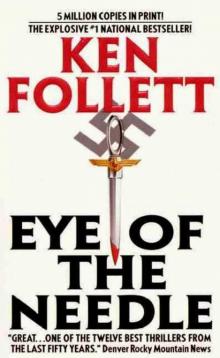 Eye Of The Needle
Eye Of The Needle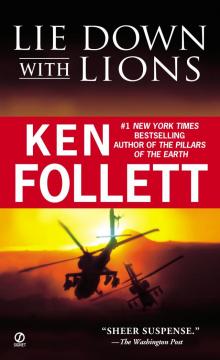 Lie Down With Lions
Lie Down With Lions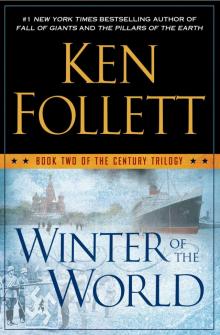 Winter of the World
Winter of the World Triple
Triple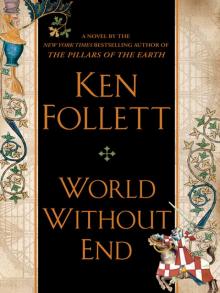 World Without End
World Without End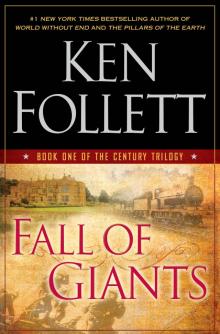 Fall of Giants
Fall of Giants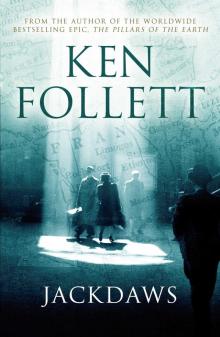 Jackdaws
Jackdaws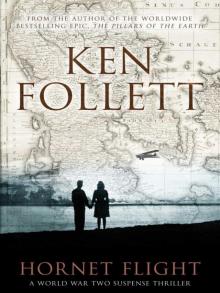 Hornet Flight
Hornet Flight Whiteout
Whiteout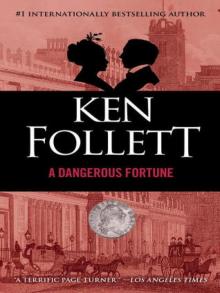 A Dangerous Fortune
A Dangerous Fortune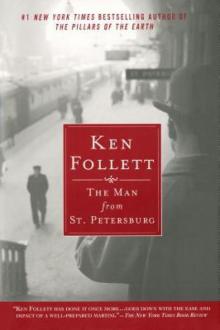 The Man From St. Petersburg
The Man From St. Petersburg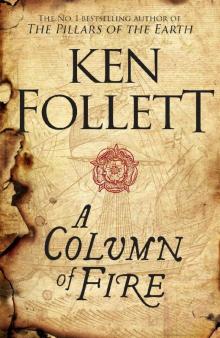 A Column of Fire
A Column of Fire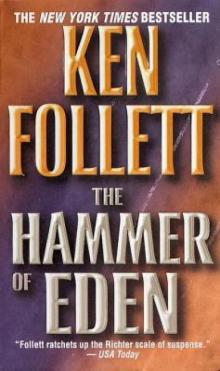 The Hammer of Eden
The Hammer of Eden On Wings of Eagles
On Wings of Eagles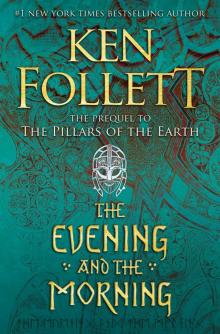 The Evening and the Morning
The Evening and the Morning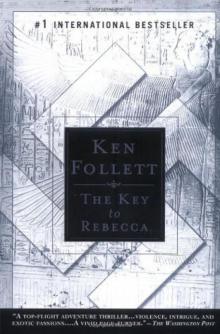 The Key to Rebecca
The Key to Rebecca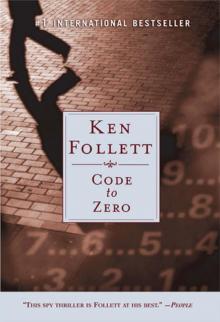 Code to Zero
Code to Zero Paper Money
Paper Money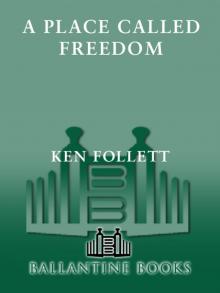 A Place Called Freedom
A Place Called Freedom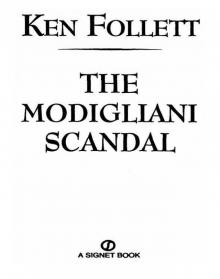 The Modigliani Scandal
The Modigliani Scandal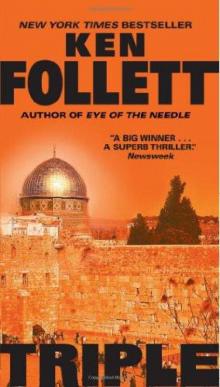 Triple (1991)
Triple (1991)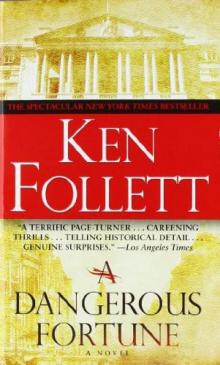 A Dangerous Fortune (1994)
A Dangerous Fortune (1994)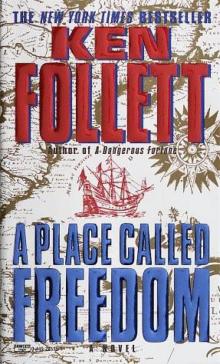 A Place Called Freedom (1995)
A Place Called Freedom (1995)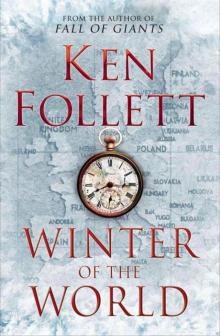 Winter of the World (Century Trilogy 2)
Winter of the World (Century Trilogy 2)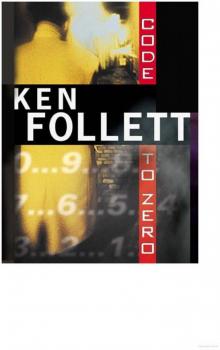 Code to Zero (2000)
Code to Zero (2000)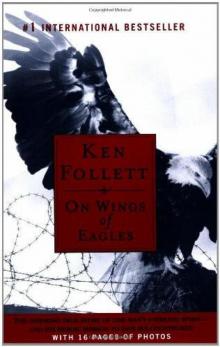 On Wings Of Eagles (1990)
On Wings Of Eagles (1990) Storm Island
Storm Island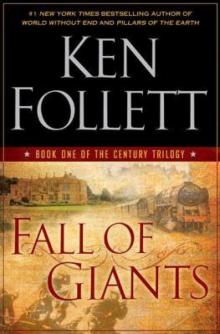 Fall of Giants (The Century Trilogy)
Fall of Giants (The Century Trilogy)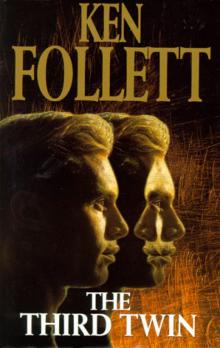 the Third Twin (1996)
the Third Twin (1996)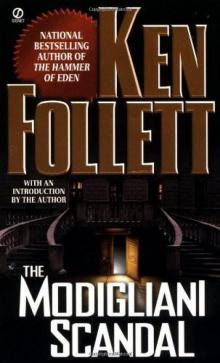 The Modigliani Scandal (1976)
The Modigliani Scandal (1976)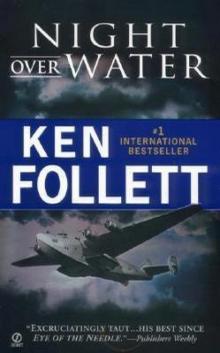 Night Over Water
Night Over Water